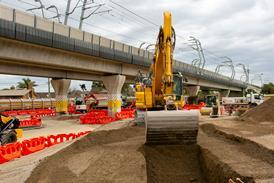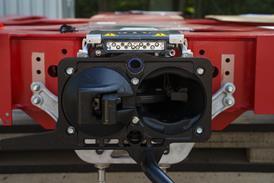Huawei held its Connect 2025 summit in Shanghai in mid-September, where the company offered insights into AI deployment in rail and emphasised the importance of multimodality in the future development of the transport and logistics market.
Huawei held its Connect 2025 summit in Shanghai in mid-September, where the company offered insights into AI deployment in rail and emphasised the importance of multimodality in the future development of the transport and logistics market.
Huawei’s strategy in the rail sector is heavily focused on making use of Artificial Intelligence and wider information technology tools to create safer, more efficient, and fully digitalised railway and logistics market. This priority was evident during the Huawei Connect 2025 event held in Shanghai from September 18-20, which centred on the theme of ‘All Intelligence’.
Huawei’s Smart Transportation Business Unit emphasised its commitment to deep innovation in communications networks, computing power, and AI to advance the sustainable development of transport networks. In its most recent annual report, the company reported that it invests no less than 20.8% of its turnover in R&D activity. For the rail sector, this translates into a strategy focusing on several key areas:
Digital and Intelligent Foundation: Building a robust ICT foundation to enable digital transformation across rail operations. This includes deploying advanced communication systems like the Future Railway Mobile Communication System standard, cloud platforms, and edge computing to facilitate real-time data analysis and control.
Specific solutions demonstrated at the event showcased the use of AI for enhanced perimeter security at rail facilities like yards and depots; this technology has already been rolled out in South Africa. Another AI innovation was
Trouble of moving Freight car Detection System , a computer vision-based automated inspection tool that reduces the need for manual checks of high speed freight train at China Railway depots. Huawei reports that this has been able to detect 99.3% of faults accurately, significantly reducing the need for human staff to undertake overnight depot tasks.
Rail in a wider context
The Huawei Connect 2025 event was a platform for the technology giant’s overarching strategy of ‘All Intelligence’, and its scope covered a wide array of AI-driven developments across multiple sectors.
The company is keen for more of these innovations to be adopted in rail in the years ahead, and visitors were able to gain insights into potentially transferable innovations in areas such autonomous truck driving and optical fibre sensing for infrastructure asset management.
Addressing the event’s Railway Summit on September 18, Ma Yue, Vice President of Huawei & CEO of Huawei’s Smart Transportation BU, told attendees that the focus of rail development was shifting from infrastructure megaprojects to enhancing operations and maintenance.
However, he also emphasised that rail must be developed in the context of multimodality. ‘As a key node in the comprehensive transportation system, railways are transforming from traditional to next-generation infrastructure’, said Ma Yue. ‘By integrating railways with roads, aviation, and waterways, we are creating a seamless logistics network that connects vital hubs like customs and ports, ultimately building a more efficient and cost-effective comprehensive logistics system. This will drive the rail transportation industry to become more intelligent, secure, and efficient.’
Yue then emphasised that Huawei’s principle of open collaboration is critical to tackling the challenges inherent in upgrading complex systems. He cited Huawei’s joint efforts with global partners in serving more than 100 ports and 200 logistics enterprises.Over 300 urban rail lines in 70+ cities. And over 180,000 Km of mainline railways.A road network exceeding 200,000 km.More than 210 Airports, airlines and air traffic bureaus. .
In his concluding remarks, he thanked companies in the rail and transport sector for the support they had shown to Huawei in recent years, and pledged that the company would deepen joint innovation in communications networks, computing power, AI, and talent cultivation to advance the sustainable development of the transport sector.


















